

|
LISTEN, RAILS! Every click of the rails is singing to you,
Published by Industrial Workers of the World 2422 N. Halsted St. Chicago 14, Ill. |
The working class and the employing class have nothing in common. There can be no peace so long as hunger and want are found among millions of working people and the few, who make up the employing class, have all the good things of life.
Between these two classes a struggle must go on until the workers of the world organize as a class, take possession of the earth and the machinery of production, and abolish the wage system.
We find that the centering of management of the industries into fewer and fewer hands makes the trade unions unable to cope with the ever growing power of the employing class. The trade unions foster a state of affairs which allows one set of workers to be pitted against another set of workers in the same industry, thereby helping defeat one another in wage wars. Moreover, the trade unions aid the employing class to mislead the workers into the belief that the working class have interests in common with their employers.
These conditions can be changed and the interest of the working class upheld only by an organization formed in such a way that all its members in anyone industry, or in all industries if necessary, cease work whenever a strike or lockout is on in any department thereof, thus making an injury to one an injury to all.
Instead of the conservative motto, "A fair day’s wage for a fair day’s work," we must inscribe on our banner the revolutionary watchword, "Abolition of the wage system."
It is the historic mission of the working class to do away with capitalism. The army of production must be organized, not only for the every-day struggle with capitalists, but also to carry on production when capitalism shall have been overthrown. By organizing industrially we are forming the structure of the new society within the shell of the old.
" An Injury to One Is an Injury to All"
A Foreword About Those
Who Wrote This Booklet
This booklet, like the movement to organize railroad workers into the One Big Union of the I. W. W., comes from actively engaged railroad workers themselves. The authors do not make their living by writing or by organizing. For over thirty years each of them has made his living by working in the railroad industry. They were selected as a committee by their fellow workers who wanted the best possible working conditions and who realize they will need the best possible unionism to get them.
For this reason they selected the I. W. W. because of its structure, policies, principles and its 43 years’ clean record of no sell-outs, no crossing of picket lines, no scabbery and continuous working rank and file control.
They have made rapid progress. At the present time they have delegates in the following departments of railroad transportation: Engineers, Firemen, Conductors, Trainmen, Car Inspectors, Dispatchers, Switchmen, Signal Operators. Not one of these is drawing pay from the union for his work. They give the necessary hours to their boss on the job and the other hours are devoted to rest and organization activity. This shows their sincerity and determination. Every delegate has years of experience in railroad transportation and in the more than twenty unions that keep railroad workers divided. It is their firm determination to organize all who work for the railroads.
In making this booklet to explain why they want industrial unionism, and what they hope to accomplish with it, they have picked up whatever good idea they could find anywhere, without concerning themselves with crediting the originator, certain that a good idea should be circulated.
They propose Tentative Demands. They are tentative because a democratic organization does not get its demands shoved down its throat. It is not enough to re-organize railroad labor industrially. An industrial union with the policies of the present craft-union leadership, while it might be better than craft unionism, is not good enough. The men who have sat up nights to prepare this booklet want you to read it, to think about it, and circulate it.

The vast majority of railroad workers of all crafts are dissatisfied with their present form of organization, with leadership, and most of all, with their wages and working conditions.
In office and round-house, in switch-shanty and caboose, there is constant grumbling and "beefing." But obviously grumbling and beefing, though they may relieve the feelings, don’t help much on payday.
Railroad men have long suffered low wages and deplorable conditions in the vain hope that the Brotherhoods, through legislation, demands or pleadings, would alleviate them. On a few the truth has dawned that the Brotherhoods are outmoded and can no longer protect our interests. They have become gigantic insurance and coffin clubs, and have increased membership dues and plastered assessments until the members groan under their burden.
Railroad workers have grown weary of oily promises that brought nothing but higher dues.
This restlessness showed itself from coast to coast until the noise made by the rank and file grew loud enough to reach the ears of the Great Brotherhood Chiefs and roused them from their lethargy.
Thus came the great run-arounds of the post-war era, the short strike of the Trainmen and Engineers in 1946, and the threatened strike of the other three operating crafts in 1948, the ugly maneuvers and talks of deals with the President to make sure that those crafts that fought would not be rewarded better than those that didn’t fight. The results have been inadequate wages, and the application of pattern increases to an obsolete wage structure, leaving railroad workers the only organized workers who don’t get overtime pay for all overtime work, who have to tolerate violation of the Supreme Court ruling that all workers should be paid for all time they must spend on the employer’s premises.
In desperation a few dauntless and progressive rails, recognizing the true situation, cast about them for a way out of the dilemma. They also possessed the foresight to see that old or new administration is pledged to destroy organized labor as it has existed, and that the few gains made in the past half century are in danger and the chains of poverty and want may be restored.
They knew what they wanted and needed: An Industrial Union, one free from insurance rackets and politics. They also knew that a labor union is an organization formed by wage workers to serve their interests as wage workers. Their interest must be to secure an adequate wage, reasonable hours and good working conditions.
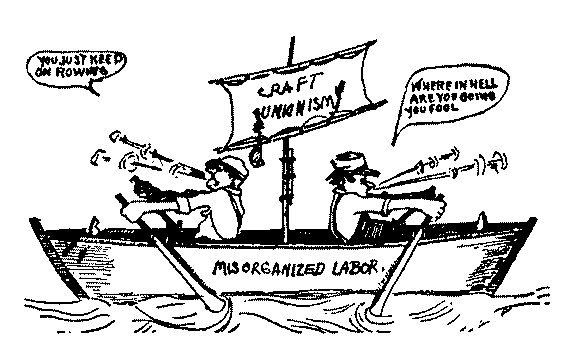
A careful study convinced them that economic solidarity was essential to winning their objectives and that for the union to try steering the political preferences of its members disrupts their union solidarity based upon uniform economic interests, because of the variety of political preferences of the members.
In their search for the right sort of union, they discovered and settled upon the Industrial Workers of the World, as the only union in the United States that has these desirable and necessary qualities.
After much consideration, inquiry and careful perusal of I. W .W .history, theories and precepts they were amazed to learn that the organization was founded in 1905 and has functioned ever since (over 43 years) without a labor blemish against its record.
A truly American organization formed by Americans in America to cope with American workers’ problems.
It has won many strikes, conditions and other benefits for the workers and has never scabbed or crossed a picket line.
In the light of all this the rails believe that this organization is the final answer as it meets with the requirements of the definition of a labor union and offers a solution to all workers’ problems. Encouraged thus, they contacted the nearest I. W. W. headquarters and made a plea for inclusion of the railroad workers.
While they might be a little late in realizing all of this, it is sincerely hoped that it will prove timely.
The I. W. W. chart includes ALL railroad workers from the section men upwards and is numbered and known as Railroad Workers Industrial Union No. 520.
Although young as yet having started only a couple of months ago we have built a tremendous following in the short time.
Of course many rail workers are not as yet acquainted with the facts and many have not heard of it, hence this little booklet which is intended to serve that purpose. It discusses some of the facts, problems and a partial list of proposed tentative demands.
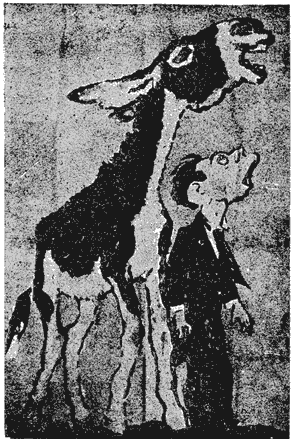
Don’t Bray—Organize!
The I. W. W. has no President nor Vice-Presidents, no lobbyists in Washington nor politicians to clutter up or obstruct the workers in running their union and economic affairs. A General Secretary-Treasurer is nominated and elected by General Referendum ballot, voted on by all members of the I. W. W. The G.S.T. is elected for only one year and cannot serve more than three terms in office. The G.S.T. has no legislative power, only executive authority over headquarters and the Clearing house and must carry out the dictates of the membership as laid down in conventions and by referendum ballot.
Each industrial union elects a General Executive Board member. This Board is in continuous session, by mail, without pay, except when actively engaged in organization work. This Board meets on the call of their chairman or the Industrial Unions and acts on matters that spring up between conventions and referendums.
The G.E.B. is not a legislative body but merely executive in character. Anything legislative arising must be submitted to the Industrial Union Membership or the I. W .W. membership as a whole as the case might be.
The General Sec’y Treas. and the General Executive Board, when elected become members at large and represent the whole I. W. W. membership.
The G.E.B. co-ordinates the work of the entire organization, secures co-operation between all Industrial Unions and other component parts, and guides the policy of its press and its educational work.
Each Industrial Union elects a General Organization Committee from the ranks of the workers in that industry. The size of this committee is decided by the Industrial Union in accord with the size of the membership and the districts to be covered, which is large in I.U. 520.
This organization committee functions without pay—except when actually engaged in organization work. This is decided by the G.O.C. as a whole and the membership.
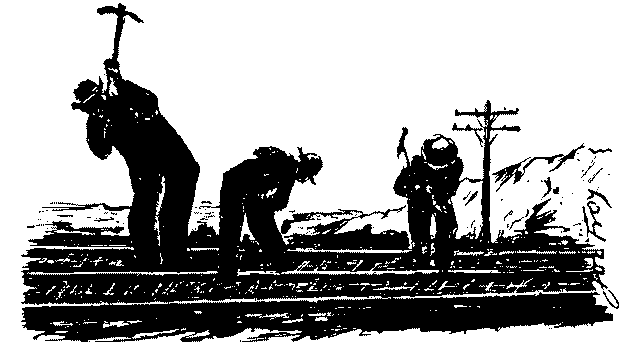
No General Official nor I. U. Official has the power to call a strike on or off. That is decided by the membership directly concerned.
The Clearing House was created to eliminate duplication of work and hold expenses to the minimum. All General and Industrial Union funds and records go through the Clearing House and are credited to and deposited to the part of the organization to which they belong.
The General Secretary-Treasurer and the bookkeeper and such necessary help as is essential for the office work are paid through the Clearing House.
The expense of the Clearing House is divided pro rata among the Industrial Unions according to the number of dues stamps each uses.
Industrial Union Branches elect their own Branch Secretary and retain their own Branch Treasury and elect such committees in their locality as they deem necessary.
Industrial Union Councils can be formed in a district by the various branches of the same Industrial Union. Industrial District Councils can be formed in a district by the different Industrial Union Branches.
Industrial Unions can draw up their own by-laws governing themselves as long as they do not conflict with the principle of the I. W .W. and the General Constitution and by-laws.
Job delegates or local organizers are appointed by the General Organization Committee or by the Branch Secretary on the recommendation of members of the union.
The foregoing is an outline of industrial organization in conformity with industrial structure.
The I. W. W. provides a tested plan for the democratic organization of the working class so that
1) all workers on the same job, regardless of craft, belong in the same job organization;
2) all workers in the same industry belong in the same industrial union;
3) all members of these Industrial Unions are directly members of the One Big Union of the entire working class;
4) any worker changing his job is entitled to transfer free of any charge to the Industrial Union covering his new employment: "Once a union man, always a union man."
It is truly a "union of one for all and all for one."
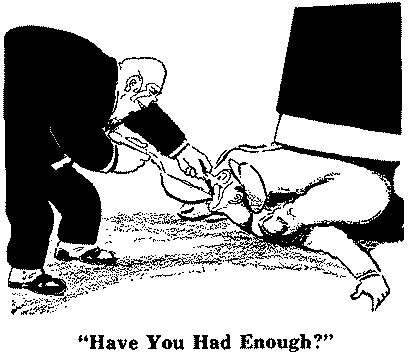
The Industrial Workers of the World Railroad Workers Industrial Union No. 520 unites all railroad workers from the section men upwards to dispatcher in order to secure protection and economic equality for all.
It is proposed that present contracts be suspended and brought up to date to meet modern requirements. Stream-lining and elimination of many out-dated rules, such as arbitrary rules, superfluous penalty and mileage classes will benefit the railroads, the public and shippers in many ways by faster and better train movements, also result in enormous annual savings through simplification of time-keeping, material and personnel.
Naturally we expect some of these savings to reflect in improved conditions and in our pay checks.
For over 32 years there has been no reduction of working hours or in the hours of service act.
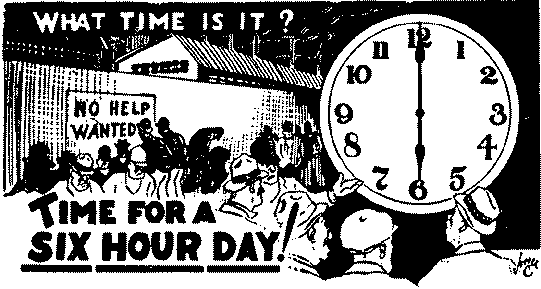
We will ask for a six-hour day for all workers and a 12-hour federal law. Straight rates to be asked for all classes of power, in all classes of service irrespective of size, weight, auxiliary devices or size of -cylinders. In other words, one rate for all power in all classes of service.
Twenty-one dollars ($21.00) for the daily rate for all workers plus $6.00 a day for away from home expenses to equal Government employees. A differential for night work, 6 P.M. to 6 A.M. Crews starting before 6 P.M. to be paid day rates until after 6 P.M. and at night rates for all time thereafter plus one and onehalf time after six hours at night rates.
Five days a week for all workers in all classes of service. Double time Sundays and Holidays.
All service on roads in Canada and Mexico to be counted in computing pension time, also provision for widows and minor children dependents of workers killed or dying in service or pensioned after death.
All workers to be entitled to at least two or more representatives or witnesses of their own choosing from any department or other source desired, to represent them at investigations.
All firemen to receive progressive examinations for promotions to engineers and to receive such examinations after three years service and to receive their dates on completion of final examinations and in no case to exceed five years from date entering service before final examinations are held.
Pool freight crews will perform such or any service required en route by yardmasters, station agents, dispatchers or other authority without penalty, except that road crews will not be required to perform yard switching at initial, intermediate or home terminal yards.
Road crews will make straight set-outs or pick-ups, hang cars while being filled out or cars taken off by yard engines, set out or spot stock or other cars, pick up on more than one track at any station except where yard engines are employed, fill other trains and lap back without penalty.
Abolish terminal miles, terminal delay and initial delay.
Elimination of mileage and mileage schedules in computing overtime. Straight time for H.A.F.T., commencing after the first eight hours from register to register in each 24-hour period and such time not to be run off. No aggregation of time against hours of service act to be permitted.
Thirty days’ vacation with pay. After 20 years, pension at $75.00 a week.
Watch repair maintenance, cleaning, oiling and care of watches to be provided by the company.
All company business, examinations, coroners inquests, court witnesses, etc., to be paid at basic daily rate plus expenses.
Dormitories for road engine and train crews, with locker rooms, wash rooms, showers and toilet facilities. Spring beds to be provided. Sheet and blankets to be changed daily. All blankets to be sanitized and aired for each use. Beds to be rested and mattresses aired after each occupancy at least eight hours.
Dormitories built to meet building engineers’ specifications and health and sanitation authorities. Buildings to be fire and damp proof. Buildings to be sound proofed, air conditioned and heat controlled.
All linen to be kept clean by the company at no charge to crews. Recreation facilities and reading tables provided, adjoining, adjacent or immediately near the dormitories. Restaurants to be located near and maintained by the company.
Work clothes, overalls, shirts, caps, gloves, shoes and etc. to be provided by the company at cost to employees. Uniforms and garments to be furnished by the company and kept clean and in repair.
A Federal train limit bill, in freight and passenger service. One thousand dollars ($1,000) to be paid dismissed employees for each year of service. Elimination of the blacklist system.
Conditions peculiar to certain divisions or roads will be cared for by the rank and file of such divisions to meet conditions on such divisions and/or roads. All present existing conditions and schedules to be debated, voted on and sanctioned or ratified by rank and file of all roads in a general session before any action will be taken.
Local rulings to be handled by rank and file on each division. Here are a few thoughts to some of the problems to be met, fellow workers and we offer them only for your consideration of what we should and can have.
In the light of the past, many of these seem fantastic and radical, and they are, but, still they are within the realm of possibility, and we must adjust ourselves to radical changes if we are to put ourselves in our rightful place at the top and not the bottom as at present.
We are not unmindful that radical changes are sometimes fraught with danger and as each individual will be affected, we ask you to weigh and consider each contemplated change or revision, carefully and send your suggestions, opinions and advice, as each of you must vote for or against and aid in revising schedules and rules.
Mileage must not be considered, as mileage will not buy anything, we must reckon in terms of money. Seniority will remain unaffected. Some older men may not agree because over-miles or over-time under old schedules that now pad their checks higher than the majority will be pared down under the new, on a par with all workers. Seniority entitles a worker to a more desirable job but not more pay.
The argument that his seniority is being curtailed because he cannot hog more money than his fellow workers is a selfish one and will not hold water.
Condition of engines and all equipment to be maintained and kept within Federal requirements.
Supervisory officials such as road foremen of engines and their assistants; train masters and aids, assistant trainmasters, engine instructors and heads of shop, yard and office force, will be selected and appointed from and by the rank and file according to their proficiency and ability.
In their argument before the emergency fact-finding board, engineers, firemen and switchmen testified for a rules proposal to provide time-and-a-half pay for Sunday and holiday work. Such overtime pay for work on Sundays and holidays is now accepted in many other industries but not on the railroads.
For night work between 6:00 p.m. and 6:00 a.m., with its extra hazards and difficulties the Railroad Workers Industrial Union No. 520 is seeking an additional 25 per cent an hour as a night differential. Such a differential is an established principle in many other industries.
Accidents to rail men working at night average 68% greater than during the day. Yet the workers have had no extra compensation for the special hardships and risks of night work.
All the wealth of the world is produced by its workers. It would seem quite reasonable then that when these workers are too old to produce any longer, that they should be supported in decency and comfort out of the wealth they have produced in a lifetime of toil for the employers. But the pension law says that if workers want any security in their old age, they must pay for it by depriving themselves of part of their already inadequate wages through a whole lifetime!
When a horse gets too old to work, if he has a decent master, he is put out to spend his declining years in peace on the master’s pastures. But what would you think of a master who during the productive years of the horses’s life, took a handful of oats out of the horses’s manger each day on the pretext that this was needed to support the horse in his old age? Yet this is the principle on which the present pension law is based.
The horse is just a dumb beast, but we think any horse of average intelligence would see to it that a master who tried such a shabby trick got a swift kick in the pants every time he reached into the manger for the "old-age deduction". Our brilliant Railway Labor Executives however just nicker contentedly and nuzzle the master’s hand.
From the check stubs of an engine foreman for February, 1948 we take the following figures for earnings and deductions:
| First half | Second half | |
| Earn . . . . . . . . . | 132.12 | 132.96 |
| Fed. Tax. . . . . . . | 15.00 | 19.30 |
| Ret. Tax. . . . . . . | 7.60 | 7.65 |
| Hospitalization. . | 2.75 | No hosp. deduction |
| ——Total. . . . . . . . . | 100.77 | 106.01 |
NOTE: Check on second half is larger amount than first half although $2.75 is deducted for hospital, because yard crew worked twenty-five minutes overtime, which cost employees four dollars and thirty cents. Members of Railroad Workers Industrial Union 520 are opposed to any deductions made by Railroad Company.
The Retirement Board requires Railroad Companies to deduct $17.25 per $300,000 in anyone month from employee earnings. Yet thousands of Railway employees complain deductions run from 20 to 60 cents over the maximum amount required by law.
Most railroads deduct from $3.75 to $4.00 each month for hospital fees, and only one person eligible for treatment or hospitalization regardless of the number of members in an employee’s family. Many corporations grant their employees and family free medical treatment and hospitalization. We also demand the same freedom.
The average pension for retired Railroad Workers is about $70.00 a month, or $840.00 a year, many less and a few more. Compare this with retired Railroad Officials.
Retired Chairmen, President, Vice-Presidents, Solicitors, etc., receive a pension ranging from $10,000 to $35,000 per year on ten leading railroads. (See Railroad Notes, April 1948)
Now figure up your average weekly pay and your average per year and compare it with the salaries of Railroad Officials, which range all the way from $50,000 to $110,000, the latter amount was paid by the Pennsylvania Railroad System to its President M. W. Clement in 1945.
This gave Clement $2,115 a week, outside of other compensation from the railroads, or more than 45 times the average weekly wage of railroad workers that year.
You railroad workers who actually operate the railroads and keep them in repair, make it possible, through your low wages, for these railroad executives to draw their high salaries and live off the fat of the land.
It is no wonder that they try to keep you down.
No Congressman protests against pensions for well paid generals or politicians or their widows. Which serves the world best, its railroad workers or its politicians and generals?
The bells of human progress ring. We should no longer be content with an occasional dime more an hour; we should aim at no less than plenty for all of us. When we get off our knees our masters won’t look so tall. And we should organize right while some still chortle that "good times are here again" and before we see again those bigger and better flophouses, bigger and poorer old clothes sales. bigger and poorer souplines. Or have you forgotten 1930 and the women and children living in hobo jungles?
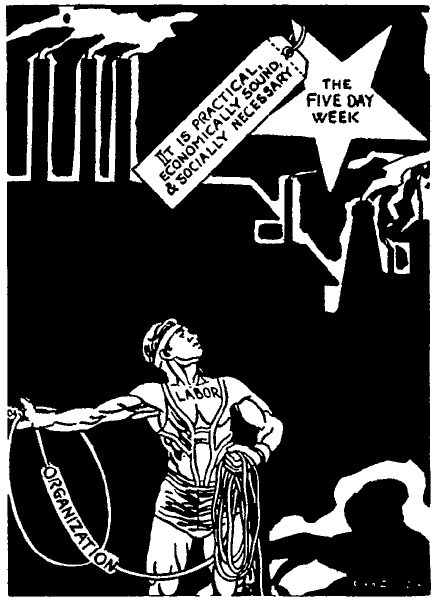
Many discouraged railroad workers, dissatisfied with past and present conditions, are looking askance for relief in some new order. Some have declared for an independent organization. Careful analysis will prove such independents can only revert back to their same old ills. Fat jobs and false promises.
Others have heard vaguely of the I. W. W. and are asking—What is the I. W. W.?
In brief the I. W. W. is the Industrial Workers of the World. Founded in 1905 (Remember the date) by the Western Federation of Miners and other unions and with the aid of Eugene V. Debs.
Debs organized the firemen, the B. of R. T., the telegraphers, etc., and the American R.R. Union or A.R.U., which is really the parent I. W. W.
The A.R.U. was meant to include railroad men only, whereas the offspring, the I. W. W. is meant to include all workers around the entire globe.
What are the I. W. W. aims and purposes? To give economic strength to the workers and emancipation from wage slavery. How can this be done? Only by One Big Union.
Who are its leaders? There are none. The rank and file are the supreme authority.
How is organization work accomplished? By fellow worker committeemen elected by the rank and file.
How much pay do they get? The same pay, if any, as you get on the job—not one cent more.
What will keep them from selling out? The rank and file.
Any changes proposed or otherwise must be sanctioned and ratified by the rank and file. Any other means tried would expose him or them to the membership. The interests of the rank and file must be their interest as they will be returned to the job. If you do not get, they will not get.
How will younger workers fare? Roundhouse, shop, office employees and others will share equally in all benefits. Why? Because their bills are just the same as yours. Food, rent and clothing costs them the same.
What incentive then will a younger worker have to work for a bigger job or accept more responsibility? The same as any bunch of school boys in a sand-lot, all want to be pitchers. How will this affect seniority? It will not. Older men are entitled to their seniority rights and any easier or more desirable job. But not more pay. They are not more valuable to the boss than any other man. They may think so, but they are not. If they think so, they only delude themselves.
Engineers, Conductors, Yardmasters, Engine-foremen, General Car foremen, straw bosses must wake up and realize that only economic equality can help them, Until they do, they will have only their own inflated ego to nourish them and will have to continue to suffer rotten conditions and low pay, as a price for their blind self conceit. Why should they care about others getting the same benefits—unless blind jealousy and selfishness motivates them.
If they cannot concede this, then they are narrow minded, craven hearted, unmoral and utterly selfish. They do not deserve what they now enjoy and are mentally small for the position they now hold.
Their little authority, their little prestige will not be taken from them and they may indulge their vanity. The younger man may not want this but he does want and is entitled to the same pay and benefits and the right to enjoy the good things of life.
Now how do we vote? That is your business. What church or lodge must I belong to? That too is your business.
We do not believe in the destruction of food or property. Weare builders, not destroyers. Only frustrated feeble minds want to destroy. We teach economic equality, class freedom and emancipation from wage slavery.
We will not teach you any Hokus Pokus, we have no childish games, secret signs, grips, pass words or goat riding, to divert your minds from the union mission and NO insurance to sell. You will not listen to honeyed words, flattery or false promises, in order to soften and placate you.
You will be made aware that this is a tough world, a tough fight and you will be heartened and toughened for that fight with the knowledge that there will be no division of labor to scab on you. Every fellow worker with you and none against you. One for all and all for one.
You will have a voice and you will be heard. You will have a vote on what goes on and your vote will be counted.
It’s all entirely up to you, if you want these things. If they mean something to you and your family, then get in and help roll the ball.
It is growing faster and faster every day and will grow and grow and grow until like a mighty tidal wave it will sweep the land and cleanse us of the parasites who now: exploit and do nothing for us except take our money and pass out some soothing oil that costs them nothing.
How soon can we do anything? That depends on you. The sooner you get in and lend your voice and support, the faster we move and the faster we grow. If you have manhood, you will want the better things of life for you, for your family and for your fellow worker, which you and they are entitled to.
It’s up to you to get in and start punching. Are you afraid some one might call you a red? Remember! In 1905, Communism, as we now know it, was never heard of at that time. The Tsar was still the head of Russia. What was George Washington called?—Eugene Debs, Jack London? Remember, Debs organized the brotherhoods. If he was a red, then so are you, if you belong to the brotherhoods. Better be called a red, fellow worker, than yellow.
We are not making you any false promises. We do not intend to delude you—but this much we do promise and tell you that the I. W. W. theories and practices are proven sound and we can demonstrate that many I. W .W. theories are accepted and put into practice by big business and the C.I.O.
We intend to place ourselves where we belong, not at the bottom, as at present but at the top of the list. More pay, more leisure and better conditions.
Think how many times you have been asked to get your rest on an engine or in a caboose and run your eats. Remember an engine or caboose is not a lodging house or hotel.
Every man who does this or consents is injuring his health and scabbing on himself and fellow workers by providing a cheap train movement, as this is the only reason for asking you to perform such service. There is no emergency or shortage of crews to warrant this.
All the improved conditions and better things are yours to be had. But they must be won. They only await your pleasure, when you are ready to organize and fight for them by working together, giving your voice, your vote, your opinions and helping to educate, organize and initiate the rails into One Big Union. We intend to shower, with our messages, every division on the system, every railroad in the country, until all the railroad workers hear and know and understand our aims.
If you want to share your rightful heritage, you must join and fight for it. The sooner you do, the sooner we can arrive.
Think, Think, and ask yourself—am I really a union man at heart? Do I want to belong to a coffin club that masquerades as a union and only promises to bury me if I carry their insurance and pay for it?
Almost every great fight put up by railroad workers has been hampered and finally broken up by the fact that the men were divided along craft-union lines. Either honest differences of opinion, or desire for personal prestige, or just plain cowardice or corruption on the part of the leaders of this or that craft union have led to divided and weak action in the past, and they will inevitably lead to divided and weak action in the great struggles of the future if we do not have the vision and courage to separate ourselves from the old craft unions and unite into one big union.
Make your choice now fellow workers. Time was never more opportune and time is on the wing.
Beware! In a show down the hearts of American masters are cold enough to welcome the steel fist and the iron heel of Fascism.
To remain ignorant is to remain a slave.
Even a jackass would refuse to eat thistle and ragweed with clover all around.
The best is not too good and plenty is not too much for the workers.
The rich tell us that good hard work develops character and will power and good Americanism but why don’t these voluntary loafers—if they believe this, leave their riches to science or charity and let their children start from scratch the same as you? Don’t answer.
The inadequacy of craft unionism on the railroads has long been obvious to every thinking worker in the industry. Many efforts have been made to transform it into something more serviceable. These efforts, like those in other industries where workers faced similar problems, have wound up in failure. In general one may observe that the leadership of unions is powerfully entrenched. Constitutions and prevalent practice give the rank and file little to say about major decisions. The business we have with our employers is handled in such unions rather by officers than by workers themselves. Members have little opportunity to express opinions in their union publications if these run counter to the official viewpoint.
Those who have sought to change long established craft unions into something more progressive, regularly find that the leadership is re-inforced by a large army of "organizers" whose work is not so much to organize unorganized workers as it is to stick long noses into local lodges and smell out those who demand a better quality unionism. Even though local officers are very often those who have accepted these responsibilities in the hopes of building greater solidarity and winning better conditions, they soon find themselves tied by these responsibilities to the official —and no doubt still others, anxious to get their hands on some gravy, gladly support top leaders whom they know to be phoney.
In railroad unions, as in many others, despite these handicaps to "insurgence," occasionally the insurgents have won and elected a whole new officialdom. Though the men elected to office in such cases and those who elected them had high hopes of doing far better than before, regularly they have done much the same thing. This is not entirely because such situations offer temptations—temptations that cease to exist once the rank and file makes the decisions—or because "men are prone to be crooked." It is because these unions, like every mechanism, are certain to work according to how they are built. Past experience in changing "leaders" has shown that so little is changed by it, that it is obviously necessary, if we are to seek better unionism, to do something more fundamental about it: change the structure of unionism so that it has to work differently.
Some have had hopes of building a greater solidarity by various plans for linking unions together in federations, amalgamations and the like. Where this has been tried, it too has failed. The conflicts of leadership and of jurisdictional interest and the like have done to such ventures what conflicting national interests did to the League of Nations.
You cannot take some antiquated dwellings, pile them together and make a fine new house. If you want a good new house, you plan it the way you want it and build it according to plan. If you want good unionism, you have to think out what the union should be like, and then build it that way. (While you are building your new house, you keep your old one in as good shape as you can.)
Some seem to think that while industrial unionism is a fine ideal, conditions peculiar to the railroads make it unworkable; that the problems of different crafts are so different that there is no way of handling them in one industrial organization. The working conditions of a switchman or road engineer have little to do, they say, with the working conditions of a shopman or clerk.
That industrial structure is workable can be shown by the fact that outside of the United States and Canada railroad workers everywhere are organized either in industrial or semi-industrial organizations. This does not mean that they have the I. W. W. kind of unionism; it is usually more like that of the CIO which has transferred to plant or industrial units the type of entrenched leadership and narrow purpose typical of the craft unions. But it does show that industrial organization is workable. Even the most hard-headed craft unionist must admit that there are three things which concern all railroad workers—job security, wages and hours. These are the issues over which the real battles of the workers have been fought. It is precisely in their fight over wages and hours that the craft unions have been split during recent wage movements. A set-up in which all men who work for the railroad are in one organization does not mean that each group which really does have its own problems must be denied representation for the settlement of these problems. The I. W. W. plan of organization does not hamper such action: it aims throughout at the utmost autonomy consistent with industrial solidarity, that those directly concerned with an issue should have the say-so about what is to be done about it.
The I. W. W. union is not something to hamper you, but something to enable you to get more out of your job—more pay, better living, greater security. You can make it a safer and more agreeable job, with better fellowship among those who work on it, and more democracy and less concern about supervision looking down your neck.
The I. W. W. is built on this important idea: A union should unite workers instead of divide them; it should be run by workers and not run them; it should fight employers instead of fighting other workers; it should aim at getting for the working class ALL the wealth that labor produces.
To make sure that it is run by its members it refuses any check-off of union dues so that there will be no "taxation without representation." It gives no clique the power or motive to run it, for the power to make decisions, settle disputes, etc., is in the hands of the rank and file, and its avoidance of politics yields no motive for wanting to run it; and its salaries are kept to the average earnings of its members.
Organized capital has rigged things so that in this period of full employment and high profits, labor is living worse than it was during the war, worse than it has lived for many years. To cope with this situation, we need the up-to-date, scientific industrial unionism of the I. W. W.—the union built on the right idea.
The translation of this program from paper into living reality is YOUR job. The members of the I. W. W. are men just like you, railroad workers who are anxious to do something about our miserable wages and working conditions, and are willing to devote some time and energy to seeing that something is actually done about them. But they can no more give you the wages and working conditions and industrial form of organization outlined here than they can give you the moon. It’s up to you to join and help get them.
What can be achieved by organizing right is far more than we have outlined here. By organizing your own industry right, you are helping the entire working class to organize right. And once the working class is organized democratically in One Big Union, it can have the kind of world you want to leave for your children, where the labor of man serves the common good, where a few hours’ work each week provides abundance for all, where there is no more war or worry or fear or want. No disorganized, misorganized working class can have this; no rightly organized working class can be denied it. Your first step toward it is to organize yourself and your fellow workers.
A WORKER’S PRAYERIf in this wide-spreading universe, there be a Great God of Justice, hear me! Stiffen my watery spine: harden and straighten my loose and foolish mouth; put fire into my dull eyes. Even the beasts of the field, even the despised mule hitched to the plow, struggles that their life may be better. Redden my blood with the courage of man. Help me despise my own image in the mirror if willingly I clutter up the path of progress with my stupid meekness. Unstop my ears to hear. Open my eyes to see the glorious earth that can be made by One Big Union, the abundance for all that can replace the private plunder of a few. The sum of my prayer is: Give me sense enough to want plenty, and grit enough to go after it, for myself, my children, my wife, my fellow workers. Open the windows of my brain to the glory of it. A Blind Worker |
To build good unionism, join the I. W. W. To better acquaint yourself with its programs and to help you spread good union ideas, subscribe to its official publication.
Sooner or later railroad workers will be organized in one industrial union. You can join Railroad Workers Industrial Union then, and be a bit sheepish about it—or you can join now and be proud. That’s entirely up to YOU.
Fill out these forms and either mail to the General Office of the I. W. W., 2422 N. Halsted, Chicago 14, Ill., or turn in to your local I. W. W. office:
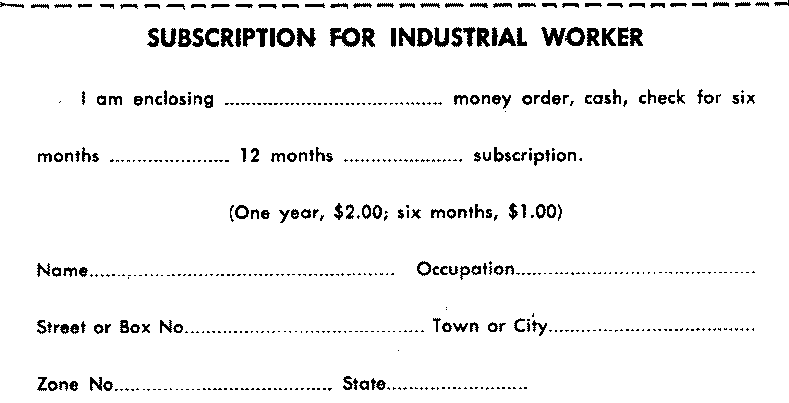
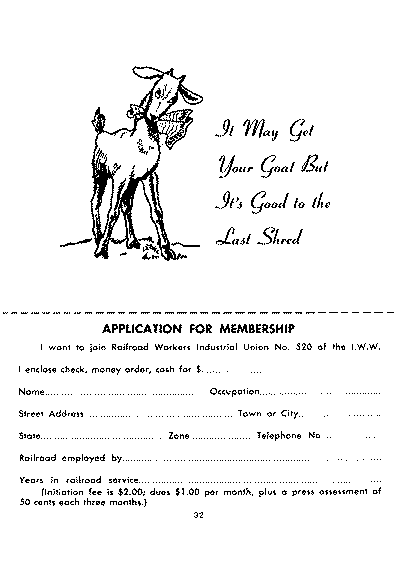
Transcribed by J. D. Crutchfield from an original kindly lent by FW Steve Kellerman, Boston GMB. Some misprints silently corrected. Reformatted slightly for easier reading.
Last updated 8 March 2004.
Last updated 5 November 2004 by David Walters for the MIA’s I.W.W. Collection. We extend our heartfelt thanks to J. D. Crutchfied for granting us permission to use his collection of online pamphlets.